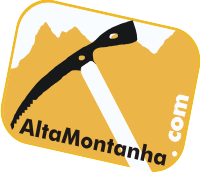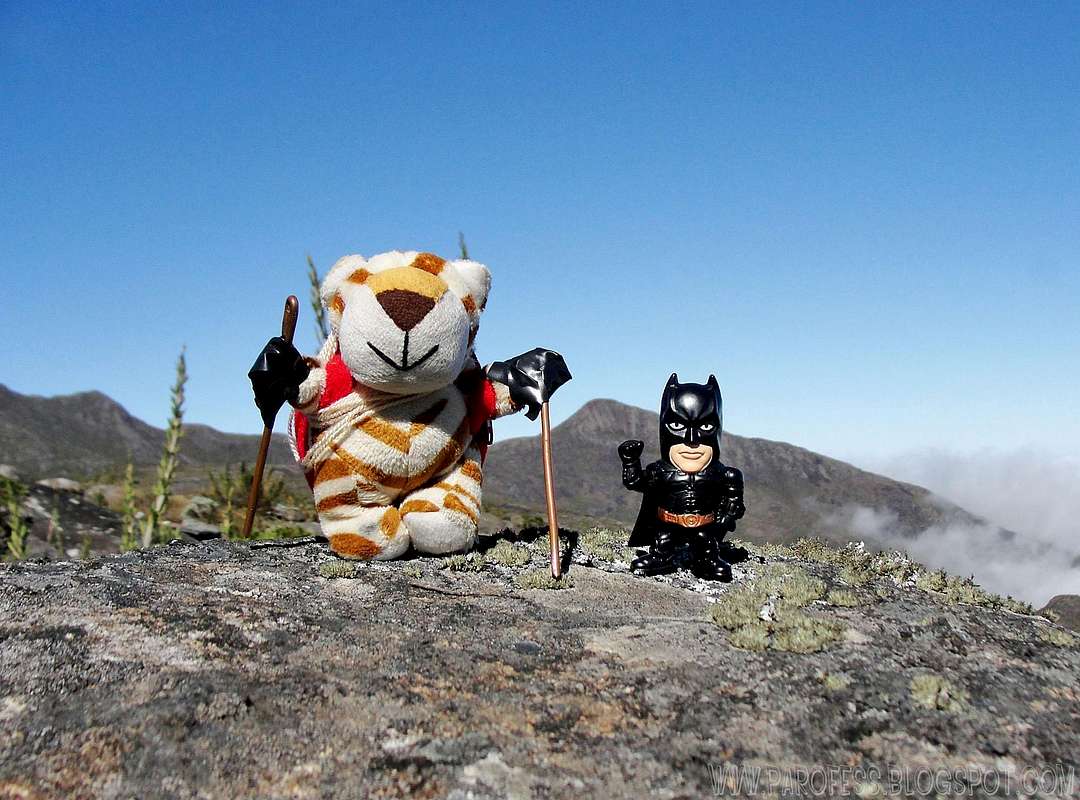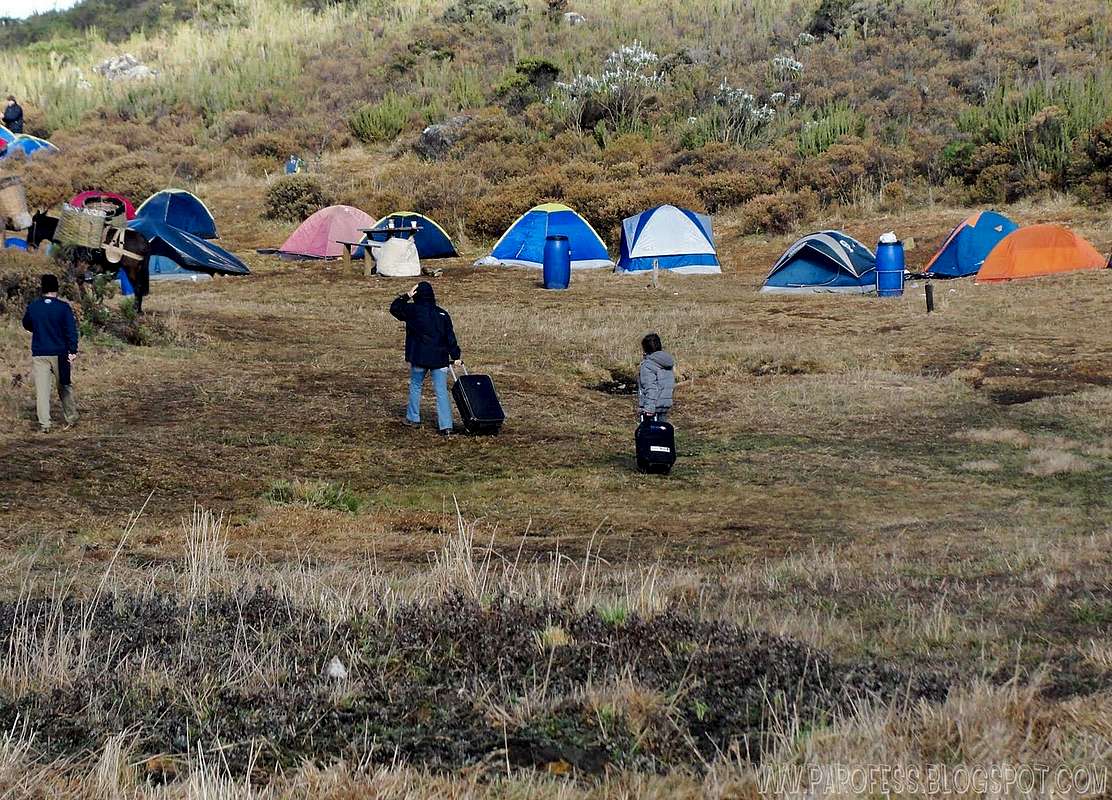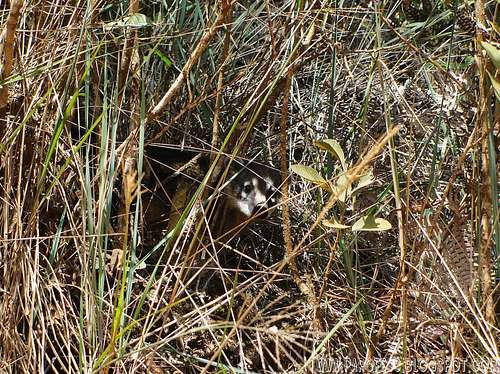The first time I visited Caparaó National Park here in Brazil on the border of Minas Gerais and Espirito Santo states, I started walking up the road on foot with two backpacks on a Sunday so everyone was leaving. I could not make my comments on the park and its visitors. This time was extremely different. At my last visit it was one hell of a weekend of four days, I expected to see disturbing things, but not as much as I saw...
It all started by the arrival at the entrance of the park (Minas Gerais side - Alto Caparaó city), a total number of reserves 1.298 (one thousand two hundred and ninety-eight) people. I do not know what is the capacity allowed in the park per day (there is an official number I know that much), but I though the number very high. As I had not made a reservation, almost couldn’t get in. But at "H" hour the jeep driver talked with park rangers and everything was resolved, I got in and before other people who was there long before me. This provided me some reflections:
1 - About visitors number: If there is a maximum daily number and was already packed as I was informed at the time I reached the door I should have been denied entry terminally and was not. I conclude that the limit is not respected. Also featured was a lack of respect for other people observing the order of arrival.
2 - On the use of mules: Once in the upper part of the park, I noticed the excessive use of mules to transport people and heavy cargo. I have seen mules carrying all types of cargo and people as well, fat people. I saw a guy who must have weighed at least a 120 kg. How can that be?! The photographer and colleague Flavio Varricchio (who btw is also a SPer) made some very important and similar observations I’m doing in this text, by the time he visited the park some time ago. He left a suggestion, the load for the mules should be regulated, restricted to prevent the mistreatment of the poor animals.
Flavio, good initiative, but I do not think the burden should be reduced but PROHIBITED. Do you guys wanna Know why I think that? Settle a cargo limit, it obviously will not be respected, and violations will be characterized. Brazil is a country that has a master degree in making laws, but has a doctorate degree in not respecting the very same laws.
What kind of management is that who cares for a national park whose major premise must be the preservation of fauna, flora, and animals, and allows this abuse to the poor beasts? I do not understand how to force the poor mule carrying weight or obese and lazy people out there qualifies as preservation. It is more like animal abuse. I left the park with a heavy heart seeing the poor mules carrying urban people up and down. The animals had visible wounds, almost exposed bones, poorly dirty fur, dehydration and rotting coffin bones.
Maybe here (I believe in the entire world) there is a culture of common sense that says that animals such as horses, mules and yaks are tools, they are used for a long time to transport cargo and people. Why people don’t do that with canines and felines? People you are wrong! Animals are not here to serve us.
Use of mules is completely outside mountaineering and altitude reality in Brazil. We do not have anything in relation to hypoxia, we not even feel it here. In the Andes people use mules for altitude, Himalayan use Yaks, and I disagree as well. I believe that if man wants to challenge their own limits, should take what's yours and leave nothing but footprints. In the Andes the poor mules work and there still exist high altitude porters. In the highest mountains in the world in Asia there are altitude porters too, but here? What is that? It's absurd. Absurd.
Let it be clear that I have no prejudice against overweight people, especially when it happens in case of illness. Everyone has the right to enjoy nature, but responsibly.
I saw tourism practiced the wrong way (even more). Many young people too messy, with alcohol (although it is prohibited within the park limits), too much garbage on the floor and the main tracks (I picked up myself a surgical glove on the trail to Bandeira Peak that appeared overnight), and believe me, even wheeled suitcase on a camping in the mountains! WTF?
![Parofito and little Bat atop...]() These two respect nature, I can say that!
These two respect nature, I can say that!![Wheeled cases on a mountain campsite? Absurd.]() What the hell is that? Wheeled cases on a mountain campsite???
What the hell is that? Wheeled cases on a mountain campsite???Notice where they're going, with the cases towards the poor mules already waiting for them.
3 - I do not care if tourists attend the mountain environment. Rather indeed, it is important not only mountaineers but regular people also to visit and see the beauty we have. Maybe that way people get the so called “contagious feeling” of respect and preservation for the nature as a whole? The problem is: You wanna do it? Do you wanna be in a mountain environment? Do it right.
Use proper equipment. Buy a decent tent and not the crap they sell in the market that can’t take breath of mouth. Use backpacks and leave the damn wheeled suitcase at home! Do not use mules, pull your own weight. Can not stand to carry everything? Share with your friends, separate tent into sticks, cover and tent stakes, and each one carries a little bit. Do not feed the animals. Throw garbage in the proper can and cover it. Want to chat with your friends? Talk softly especially at night, respect others' right to sleep and enjoy the same peace of mind that you may even have gone for.
I saw even aliens there, but I saw none of the right things. I saw it all wrong. I saw women hiking with fashionable synthetic leather boots and color pink scarf, pink coat, and then afterwords one of these ladies had to be rescued on a stretcher and everything (and she was in pink).
Ironic. As I walked through areas permitted I only saw shit, crap and conduct errors. As I walked in not permitted area I was absolutely alone, did not found one single piece of dirt left on the mountain and not a thing that could be destructive to nature. Nobody shouted at my side and I had nice chat with the group of good people I met (which, incidentally, were among the few true mountaineers who were in Caparao that holiday). It was on my way down the mountain to reach the normal high camp Terreirão, on the trail I found a surgical glove that was not there the previous evening when I walked up. Fortunately, I had two witnesses who saw me collecting the "medical waste". An elderly couple who passed by hiking towards Bandeira Peak.
I believe that nature itself within our observation universe represented by the mountains, takes care of itself to select those who steps, conquer and respect. If there wasn”t the advent of animal abuse to load the lazy up there, nature sure d sure take care to stop them because they wouldn’t be physically able to do so. The park rangers who walk by Terreirão only worry about cleaning, that's all. Not enforce anything, and I believe that as park rangers, they should be instructed to check the user’s gear such as: tent, sleeping bag and thermic isolator at least. This prevents a work later to rescue someone who came unprepared and ended up with hypothermia.
The winter had barely begun two days before and on the second night I slept there at Terreirão by two-thirty in the morning was -2.6°C. Enough to kill some Brazilian unprepared.
Inside Lanin National Park in Argentina all equipment is checked before your climbing is permitted. Lanin ascent by the normal route has low technical level. You need to literally empty your bag and show it all to the rangers. Why not here in Caparao? Even in Itatiaia there is already something like that, if you go to Agulhas Negras Peak or Prateleiras Peak, at the entrance is required as minimum equipment such as one harness, carabiners and 60 feet of rope to the one who leads the group.
Respect is good and everybody likes it. Mainly nature. When you do not follow the protocol, sad things happen when nature charges the price (sometimes the maximum price) as the following cases:
http://altamontanha.com/colunas.asp?NewsID=1611
(unprepared Brazilian who died in Africa by hypothermia, he wasn’t a climber/ mountaineer, he was just a backpacker)
http://altamontanha.com/colunas.asp?NewsID=796
(unprepared religious Brazilian, died on the attempt to climb Sajama to pray. PRAY ON THE COLDEST MOUNTAIN IN SOUTH AMERICA??? Sometimes Sajama registers 40°C below zero. Body never found)
http://altamontanha.com/altamontanha/noticias/noticias_id=37734.asp
(Brazilian that didn’t respect the turning back warning on Aconcagua got too tired, too late, and died after the summit on 2005)
http://www.altamontanha.com.br/colunas.asp?NewsID=2975
(last month, a group of unprepared hikers got lost inside Serra do Mar range and got rescued, the authorities talk about “crimes against nature” and probably will close the trails some time in the future. Again????)
Do trekking with responsibly, climb with responsibility, respect to be respected. Regarding the direction of Caparao National Park: Inefficient, inconsistent.
A huge problem, to feed wildlife
A lot of people enjoy to feed wildlife and they think they're helping but in fact they only make things worse. I just found a very interesting text on the subject by "Paws wildlife", good website:
"There are many good reasons not to feed wildlife including:
1 - When young wild animals are taught to depend on a human-provided food source, they may not fully develop essential foraging skills. Animals who are raised relying on humans for food may struggle to survive in the absence of that artificial food source when they disperse from their parents' territory.
2 - Wild animals who are used to being fed by humans commonly lose their fear of people. Animals who are unafraid of people will approach them for food, and are sometimes mistaken as rabid, aggressive or mean, then killed for that behavior. They also become easy targets for kids with BB guns and others who mean them harm. An instinctive wariness of people is important to a wild animal's survival.
3 - The food humans usually feed to wild animals is not nutritionally complete, and it can cause serious health problems for the animals, especially when they are young and still developing. Most wild animals are opportunistic and will concentrate on the easiest food source available. When a constant human-provided food source is available, animals who would normally have a varied diet may switch to eating mainly this constantly available food. Just like humans, most wild animals need a variety of foods in their diet, and if they fill up on "junk" food, they will not get the nutrients they need to stay healthy. Because most people will feed animals food that they have in their house - people food - which bears no resemblance to what the animals eat in the wild, it really is junk food to the animals.
4 - A constant, human-provided food source may attract many more wild animals to the area than would normally be found there. Who doesn't like a free meal? When food is readily available, animals will gather in abnormally large numbers. This means that if one animal in the group has an illness or disease, it can spread throughout the group. Many wild animals do not interact with others of their own species except during mating season and when raising their young. This is one way to limit diseases among a wild population. By gathering these animals together in unnatural groups, these diseases can spread much more quickly and can destroy a large number of animals.
5 - Reproduction rates may also be affected when an artificial food source is readily available. In the wild, the number of animals being born is often directly related to the amount of natural food available. The number of animals surviving will also depend on how much food is available. This is nature's way of keeping a balance. When an unnatural food supply becomes available, animals may produce more young and soon there may be more animals living in the area than what the natural food sources can support.
6 - We commonly receive phone calls at the PAWS Wildlife Center from people whose neighbors have been feeding wild animals. Often, the wild animals have become an incredible nuisance and the caller wants to kill or remove them. Many people do not think about the neighborhood impact when they start feeding wildlife. Wild animals do not usually discriminate between one person and another, and will often start pestering neighbors. The animals may also cause damage to homes and property because they expect to be fed and have lost their fear of people."
The end is perfect:
"The best thing you can do to care for the wild animals on your property is to give them habitat, not handouts. Naturescaping is a great way to provide the animals with natural sources of food and shelter that will not put them in danger the way a human-provided food source will. You will still be able to enjoy wildlife on your property, but at a safe distance for both you and the animals.
If you are looking for a positive way to get closer to wild animals, consider volunteering at a wildlife rehabilitation center, such as PAWS, where hundreds of injured and orphaned animals are in need of a little human help."
In Caparao National Park there is a lot of problem with that too. The Quati (Nasua Nasua) is a nasty little thief. But there is one reason for that. Human presence and behavior.
![Nasua Nasua]() Nasua Nasua
Nasua Nasua
People constantly feed these animals and they don't realize the problem they're causing, plus, there's several diseases that wild animal carry and for them sometimes it's harmless but for us it can be a death sentence. Quatis in Caparao National Park have the awful routine of search the trash cans seeking leftovers. Great, great problem...
What about the park rangers? What is their actions about it? Absolutly nothing.
Our website, www.altamontanha.com, has an extremely important phrase but people not even notice: "Warning! AltaMontanha.com warns that mountaineering are activities addictive and soon at their first use. The dangers exist, especially when the boundaries are not respected, but is a very safe if practiced in moderation, awareness and respect for nature!"
Thanks to all, happy and safe climbings.
Parofes
External links
A brazilian website to get mountains info, including gps files to download:http://www.rumos.net.br/rumos/
My youtube channel: www.youtube.com/parofes - Now with 250+ videos online!
The biggest brazilian website about climbing and mountaineering, for which I'm a columnist:












Comments
Post a Comment